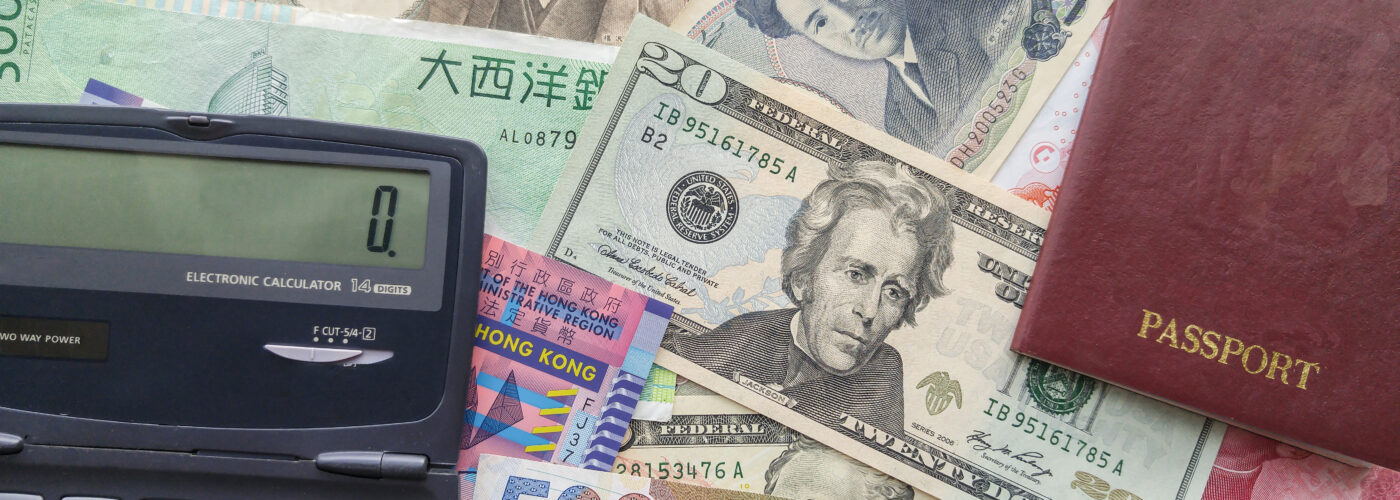When traveling to a country with an unfavorable exchange rate, many people are guilty of mentally converting prices into U.S. dollars and cringing at the price increase. A disadvantaged exchange rate alone can be enough to make you worry you’ve blown your budget. And that’s before even taking into account extra fees that come with city or airport currency-exchange counters—which is why you should never use them.
Now that cash is no longer king, most travel experts recommend that you rely primarily on plastic while traveling: specifically, credit cards for big-ticket items, and debit/ATM cards for cash on arrival. That’s right: You shouldn’t be using a cash-exchange counter to exchange currency. The best place to exchange currency is an ATM, which will typically offer better rates and lower fees (depending on your bank and destination).
The longstanding issue with that practice has always been foreign transaction fees—but you might be surprised to hear that this pesky type of fee is becoming less and less relevant.
Some cards do have foreign transaction fees of about three percent, but most big banks have done away with such charges, which makes ATMs the best way to exchange currency. (And, of course, never use a credit card to withdraw from an ATM—it’ll cost you a lot in banking fees/interest.)
There are exceptions to this practice, however: If you’re traveling somewhere like Cuba, for example, which requires that you order cash before arrival since you can’t withdraw Cuban money from ATMs with a U.S. bank card. (Furthermore, nowhere in Cuba will accept U.S. dollars, so even an airport currency exchange upon landing isn’t an option.)
With that in mind, here are your options for those times when you need to exchange some U.S. dollars.
Before You Do Anything, Research the Exchange Rate
The only way to know if you are getting the best exchange rate is to know what the current rate is. Before you leave for your trip, check XE.com for an up-to-date look at the exchange rate. If you’re taking an extended trip, check the rate periodically to stay abreast of any major changes by downloading the XE app (iOS | Android).
The Best Places to Exchange Currency or Buy Money
When all else fails, remember a few golden rules:
- Banks in your respective destination are likely to have the lowest currency exchange fees.
- Airport currency exchange counters typically offer better rates than city-center equivalents.
- “Buying” cash ahead of your trip, when it’s absolutely necessary, is best done with friends so you can split the fee, and through a membership service like AAA that charges nominal or no fees for members.
AAA members can order over 90 types of foreign currency. The currency must be ordered in person, and purchases are shipped to the branch location in about three business days. Plus, orders over $200 are shipped free.
You’ll usually get the best exchange rates at banks, post offices, and American Express offices. Hotels are also worth a try. Avoid the change bureaus you see everywhere in airports, train stations, and touristy areas, which usually have the worst rates.
Wherever you go, take the time to shop around. Read the posted exchange rates carefully, and ask for the net rate after any commissions: Some commissions are charged on a per-item basis on each transaction, others on a percentage basis.
Finally, look out for fake currency exchanges, which can be a source of scams or counterfeit currency. You shouldn’t run into this problem at reputable banks, hotels, or government-run post offices.
Tip: If you’ll be carrying a lot of cash, consider this inexpensive, hyper-organized wallet that keeps everything safe and secure in a compact place.
Know When Not to Exchange
Have you checked if U.S. dollars are accepted as readily as the local currency in your destination? For instance, the currencies in Belize, Barbados, the Bahamas, and other Caribbean nations are pegged to the U.S. dollar at fixed rates, making it easy to pay for your purchases in either American money or the local currency.
However, it’s not always a good idea to pay in U.S. dollars, even if the option is open to you. In countries where the exchange rate is variable, the price that is listed in U.S. dollars may not be a great deal; often the merchant will charge you a little extra for the convenience of paying in your own currency. Use the calculator on your smartphone to figure out whether you’re getting a fair price.
And lastly: Traveler’s checks? Not if you’re living in the 21st century. You’ll have a lot of trouble finding a bank that will exchange these checks, if you still have them. A lot has changed in travel banking in the past couple of decades—for the better.
More from SmarterTravel:
- How to Spot Counterfeit Money Abroad
- 10 Smart Ways to Carry Money While Traveling
- 8 Great Crossbody Bags for Travel
Editor’s note: This story was originally published in 2017. It has been updated to reflect the most current information. Ed Perkins, Mark Rowlands, Shannon McMahon, and Sarah Schlichter contributed to this story.
We hand-pick everything we recommend and select items through testing and reviews. Some products are sent to us free of charge with no incentive to offer a favorable review. We offer our unbiased opinions and do not accept compensation to review products. All items are in stock and prices are accurate at the time of publication. If you buy something through our links, we may earn a commission.
Related
Top Fares From
Today's Top Travel Deals
Brought to you by ShermansTravel
Australia: 12-Night Melbourne, Cairns & Sydney...
Down Under Answers
 vacation
$4349+
vacation
$4349+
Athens to Barcelona: Luxe, 10-Night Mediterranean...
Oceania Cruises
 cruise
$3199+
cruise
$3199+
Pennsylvania: Daily Car Rentals from Pittsburgh
85OFF.com
 Car Rental
$19+
Car Rental
$19+




